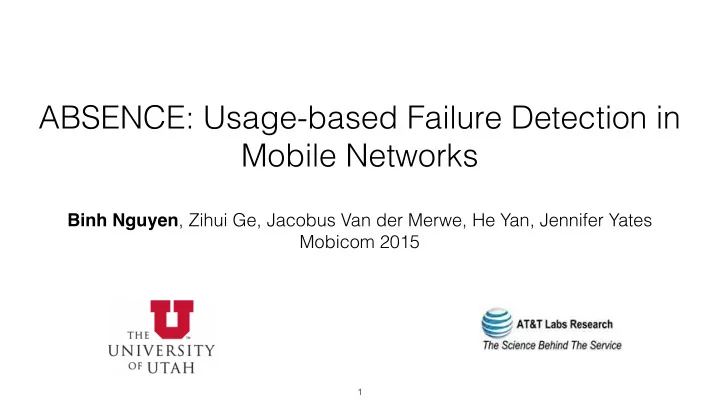

ABSENCE: Usage-based Failure Detection in Mobile Networks Binh Nguyen , Zihui Ge, Jacobus Van der Merwe, He Yan, Jennifer Yates Mobicom 2015 1
Silent failures EPC core core RAN 2
Silent failures EPC core core RAN • Silent failures: service disruptions/outages that are not detected by current monitoring systems. • New features rolled out, bugs on devices, or combination of both. 2
Silent failures EPC core core RAN • Silent failures: service disruptions/outages that are not detected by current monitoring systems. • New features rolled out, bugs on devices, or combination of both. 2
Silent failures EPC core core RAN • Silent failures: service disruptions/outages that are not detected by current monitoring systems. • New features rolled out, bugs on devices, or combination of both. Detecting silent failures is challenging! 2
Detecting silent failures is difficult - passive network monitoring 3
Detecting silent failures is difficult - passive network monitoring • Drops in traffic/usage on network elements do not imply service disruptions: • Load balancing/maintenance activities. • Dynamic routing/Self-Organizing Network (SON). Load Load balancing event expected load actual load Time 3
Detecting silent failures is difficult - passive network monitoring • Drops in traffic/usage on network elements do not imply service disruptions: • Load balancing/maintenance activities. • Dynamic routing/Self-Organizing Network (SON). • Key Performance metric Indicators (KPI) may not reflect service issues: • E.g., accessibility KPI looks good even when only a subset of users can access the network. Load Load balancing event expected load actual load Time 3
Detecting silent failures is difficult - passive network monitoring • Drops in traffic/usage on network elements do not imply service disruptions: • Load balancing/maintenance activities. • Dynamic routing/Self-Organizing Network (SON). • Key Performance metric Indicators (KPI) may not reflect service issues: • E.g., accessibility KPI looks good even when only a subset of users can access the network. Load Load balancing event expected load actual load Time 3
Detecting silent failures is difficult - active service monitoring EPC core RAN 4
Detecting silent failures is difficult - active service monitoring • Sending test traffic across the network on all service paths. EPC core RAN 4
Detecting silent failures is difficult - active service monitoring • Sending test traffic across the network on all service paths. • Many types of customer devices, applications, huge geographic environment to probe. EPC core RAN Active monitoring does not scale! 4
Recommend
More recommend